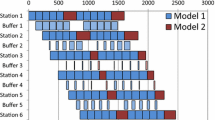Abstract
This paper is concerned with the study of the constant due-date assignment policy in a multistage assembly system. The multistage assembly system is modeled as an open queueing network. It is assumed that the product order arrives according to a Poisson process. In each service station, there is either one or infinite machine with exponentially distributed processing time. The transport times between every pair of service stations are independent random variables with generalized Erlang distributions. It is assumed that each product has a penalty cost that is some linear function of its due-date and its actual completion time. The due date is found by adding a constant to the time that the order arrives. This constant value is the constant lead time that a product might expect between time of placing the order and time of delivery. By applying the longest path analysis in queueing networks, we obtain the distribution function of manufacturing lead time. Then, the optimal constant lead time is computed by minimizing the expected aggregate cost per product. Finally, the results are verified by Monte Carlo simulation.
Similar content being viewed by others
References
Azaron, A.: Multiobjective optimal control in stochastic and dynamic networks with applications using shortest path and longest path approaches. Ph.D. Thesis, Hiroshima University, Hiroshima, Japan (2005)
Azaron A., Modarres M.: Distribution function of the shortest path in networks of queues. OR Spectrum 27, 123–144 (2005). doi:10.1007/s00291-004-0169-3
Azaron A., Katagiri H., Kato K., Sakawa M.: Modelling complex assemblies as a queueing network for lead time control. Eur. J. Oper. Res. 174, 150–168 (2006). doi:10.1016/j.ejor.2005.01.025
Azaron A., Fatemi Ghomi S.M.T.: Optimal control of service rates and arrivals in Jackson networks. Eur. J. Oper. Res. 147, 17–31 (2003). doi:10.1016/S0377-2217(02)00177-7
Charnes A., Cooper W., Thompson G.: Critical path analysis via chance constrained and stochastic programming. Oper. Res. 12, 460–470 (1964)
Cheng T.C.E., Gupta M.C.: Survey of scheduling research involving due date determination decisions. Eur. J. Oper. Res. 38, 156–166 (1989). doi:10.1016/0377-2217(89)90100-8
Elmaghraby S.E., Ferreira A.A., Tavares L.V.: Optimal start time under stochastic activity durations. Int. J. Prod. Econ. 64, 153–164 (2000). doi:10.1016/S0925-5273(99)00054-7
Gold H.: A Markovian single server with upstream job and downstream demand arrival stream. Queueing Syst. 30, 435–455 (1998). doi:10.1023/A:1019137626073
Harrison J.M.: Assembly-like queues. J. Appl. Probab. 10, 354–367 (1973). doi:10.2307/3212352
Haskose A., Kingsman B.G., Worthington D.: Modelling flow and jobbing shops as a queueing network for workload control. Int. J. Prod. Econ. 78, 271–285 (2002). doi:10.1016/S0925-5273(01)00117-7
Hemachandra N., Eedupuganti S.K.: Performance analysis and buffer allocations in some open assembly systems. Comput. Oper. Res. 30, 695–704 (2003). doi:10.1016/S0305-0548(02)00034-5
Kapadia A.S., His B.P.: Steady state waiting time in a multicenter job shop. Nav. Res. Logistics Q. 25, 149–154 (1978). doi:10.1002/nav.3800250112
Kulkarni V., Adlakha V.: Markov and Markov-regenerative PERT networks. Oper. Res. 34, 769–781 (1986)
Lipper E.H., Sengupta B.: Assembly-like queues with finite capacity: bounds, asympototics and approximations. Queueing Syst. 1, 67–83 (1986). doi:10.1007/BF01149328
Martin J.: Distribution of the time through a directed acyclic network. Oper. Res. 13, 46–66 (1965)
Papadopoulos H.T., Heavey C.: Queueing theory in manufacturing systems analysis and design: a classification of models for production and transfer lines. Eur. J. Oper. Res. 92, 1–27 (1996). doi:10.1016/0377-2217(95)00378-9
Seidman A., Smith M.L.: Due date assignment for production systems. Manage. Sci. 27, 571–581 (1981)
Shanthikumar J.G., Sumita U.: Approximations for the time spent in a dynamic job shop with application to due-date assignment. Int. J. Prod. Res. 26, 1329–1352 (1988). doi:10.1080/00207548808947949
Song D.P., Hicks C., Earl C.F.: Product due date assignment for complex assemblies. Int. J. Prod. Econ. 76, 243–256 (2002). doi:10.1016/S0925-5273(01)00170-0
Soroush H.M.: Sequencing and due-date determination in the stochastic single machine problem with earliness and tardiness costs. Eur. J. Oper. Res. 113, 450–468 (1999). doi:10.1016/S0377-2217(98)00003-4
Vandaele N., Boeck L.D., Callewier D.: An open queueing network for lead time analysis. IIE Trans. 34, 1–9 (2002)
Walpole R.E., Myers R.H., Myers S.L., Ye K.: Probability and statistics for engineers and scientists, 8th edn. Prentice Hall, Englewood Cliffs, NJ, USA (2002)
Yano C.A.: Stochastic lead-time in two-level assembly systems. IIE Trans. 19, 371–378 (1987). doi:10.1080/07408178708975409
Author information
Authors and Affiliations
Corresponding author
Rights and permissions
About this article
Cite this article
Azaron, A., Kianfar, F. Due date assignment for multistage assembly systems. Optim Lett 3, 199–210 (2009). https://doi.org/10.1007/s11590-008-0101-x
Received:
Accepted:
Published:
Issue Date:
DOI: https://doi.org/10.1007/s11590-008-0101-x




